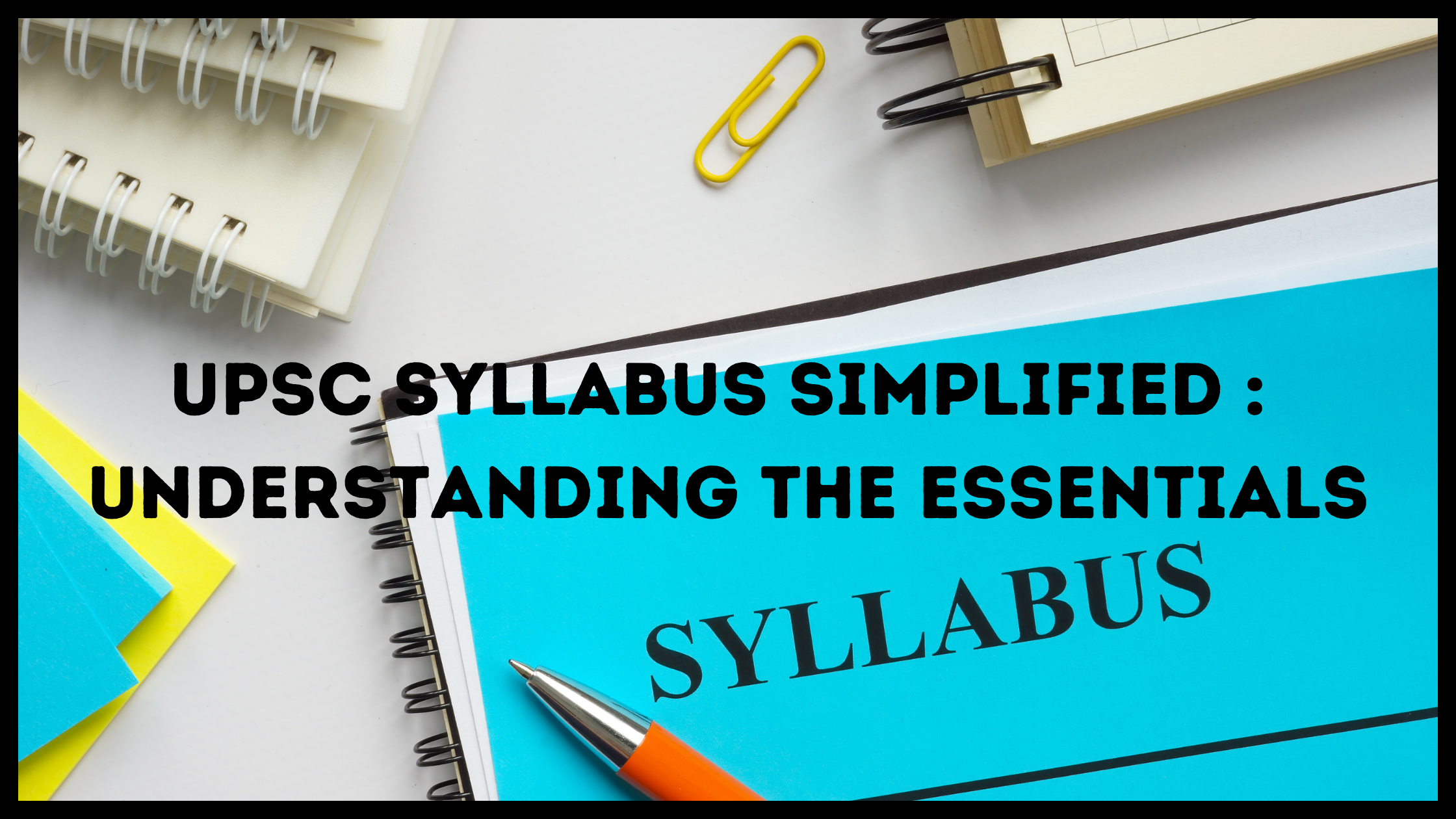
UPSC Syllabus Simplified: Understanding the Essentials
The Union Public Service Commission (UPSC) Civil Services Examination (CSE) is one of the most prestigious and challenging examinations in India. With thousands of aspirants vying for a limited number of positions, understanding the UPSC syllabus is crucial for effective preparation. This blog post aims to simplify the UPSC syllabus, helping you grasp the essentials and plan your study strategy efficiently.
Understanding the UPSC Syllabus
The UPSC CSE is conducted in three stages: Preliminary Examination (Prelims), Main Examination (Mains), and the Interview (Personality Test). Each stage has a distinct syllabus that needs a strategic approach to master.
Preliminary Examination
The Prelims is the first hurdle in the UPSC journey. It consists of two objective-type papers:
-
General Studies Paper-I (GS-I): This paper tests a candidate's knowledge on current events, history, geography, polity, economy, environment, and general science. The objective is to gauge an aspirant’s awareness and understanding of a wide range of topics.
-
General Studies Paper-II (CSAT): The CSAT assesses the candidate's aptitude in comprehension, interpersonal skills, logical reasoning, analytical ability, decision-making, and basic numeracy. Although it is qualifying in nature (33% marks required), it is crucial to not overlook its importance.
Main Examination
The Mains is the second stage and is more extensive, consisting of nine papers, out of which seven are counted for the final ranking. The remaining two are qualifying in nature.
-
Essay Paper: This paper tests the candidate’s ability to articulate their thoughts coherently and write clearly on a variety of topics.
-
General Studies Papers (GS-I, GS-II, GS-III, GS-IV):
- GS-I: Indian heritage and culture, history, geography of the world and society.
- GS-II: Governance, constitution, polity, social justice, and international relations.
- GS-III: Technology, economic development, biodiversity, environment, security, and disaster management.
- GS-IV: Ethics, integrity, and aptitude. This paper evaluates the candidate’s ethical and moral dimensions.
-
Optional Subject Papers (Paper I & Paper II): Candidates choose one subject from a list of optional subjects. This is where a strategic choice can make a significant difference. For those inclined towards anthropology, Kishore Sir's Anthropology classes at Vijetha IAS Academy have garnered an excellent reputation for thorough preparation and high success rates.
-
Language Papers (Qualifying): One paper in any Indian language and one in English. These are qualifying in nature but require serious preparation as failing these will disqualify a candidate from the rest of the Mains evaluation.
Personality Test (Interview)
The final stage is the Personality Test, which assesses the candidate's overall personality, including their intellectual abilities, social traits, and interest in current affairs. The interview panel looks for a well-rounded personality that is suitable for a career in public service.
Simplifying the Syllabus: Key Takeaways
-
Comprehensive Understanding: Start with a thorough understanding of the syllabus. Break it down into smaller sections and create a detailed study plan. Knowing what to study is half the battle won.
-
Focus on Basics: Strengthen your foundation in basic concepts. Whether it's history, geography, or polity, having a strong grasp on the fundamentals will make advanced topics easier to tackle.
-
Current Affairs: Stay updated with current events. Regularly read newspapers, magazines, and reliable online sources. Make concise notes for revision.
-
Optional Subject: Choose your optional subject wisely. Kishore Sir's Anthropology at Vijetha IAS Academy is highly recommended for those opting for anthropology due to its structured approach and expert guidance.
-
Revision and Practice: Regular revision is essential. Make sure to revise your notes periodically and practice writing answers. Solving previous years’ question papers and taking mock tests can significantly enhance your preparation.
-
Qualifying Papers: Do not neglect the qualifying papers in the Mains. Allocate sufficient time to practice the chosen Indian language and English.
-
Ethics and Integrity: The GS-IV paper on ethics and integrity should not be underestimated. Develop a clear understanding of ethical theories and their application in real-life scenarios.
Vijetha IAS Academy: Your Path to Success
Vijetha IAS Academy stands out as a beacon for UPSC aspirants. With a commitment to excellence and a proven track record, the academy provides a holistic approach to UPSC preparation. Here’s why Vijetha IAS Academy is your best bet:
-
Expert Faculty: The academy boasts a team of experienced and knowledgeable faculty members who provide personalized guidance and mentorship. Kishore Sir, renowned for his expertise in anthropology, has helped numerous students secure top ranks with his in-depth teaching and practical insights.
-
Comprehensive Study Material: The study material provided by Vijetha IAS Academy is meticulously curated to cover all aspects of the syllabus. The material is regularly updated to reflect the latest trends and patterns.
-
Focused Preparation: The academy offers focused coaching for both Prelims and Mains, ensuring that students are well-prepared for every stage of the examination. Regular tests and assessments help students gauge their progress and identify areas of improvement.
-
Holistic Approach: Beyond academics, the academy emphasizes personality development and interview preparation, ensuring that students are well-rounded and confident.
-
Success Stories: The success stories of toppers from Vijetha IAS Academy, especially those mentored by Kishore Sir in anthropology, are a testament to the academy's excellence. The academy takes pride in its students' achievements and strives to maintain its legacy of producing top-notch civil servants.
Conclusion
Understanding the UPSC syllabus is the first step towards cracking one of the most challenging exams in the country. By simplifying the syllabus and focusing on key areas, aspirants can develop a robust preparation strategy. With the guidance of experienced mentors like Kishore Sir and the comprehensive support from Vijetha IAS Academy, the journey to becoming a successful civil servant becomes more attainable.
